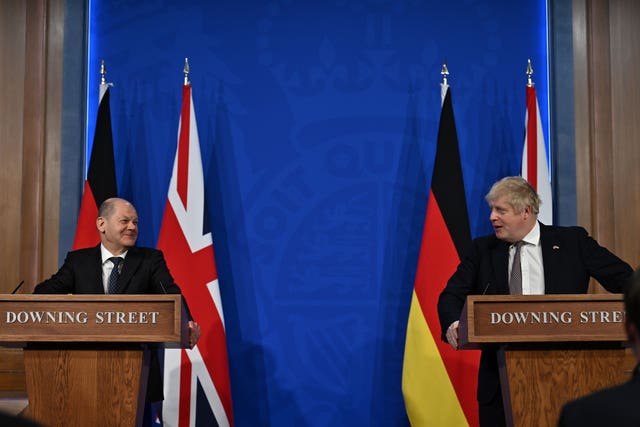Johnson announces £100m in UK military aid to Ukraine
Following talks with German chancellor Olaf Scholz, the two leaders condemn the ‘unconscionable’ strike on Kramatorsk rail station.

Britain is to send a fresh package of “high-grade” military equipment to Ukraine amid signs Russian forces are preparing for a new offensive in the east of the country.
Boris Johnson said the UK would be sending £100 million of kit including more Starstreak anti-aircraft missiles, anti-tank weapons and “precision munitions” such as drones capable of loitering in the sky until directed to their target.
Following talks in Downing Street with German Chancellor Olaf Scholz, the two leaders condemned the “unconscionable” strike on a crowded railway station at Kramatorsk – suggesting the Russians were guilty of war crimes.
Mr Johnson praised Germany’s “seismic” efforts to end its dependence on supplies of Russian oil and gas.
But following the disclosure that the EU has spent 35 billion euros on Russian hydrocarbons since the start of the invasion while sending just one billion euros in aid to Ukraine, Mr Scholz acknowledged that change would take time.
While Germany was investing heavily in renewables for its electricity supply, he said that it would need to import fossil fuels for years to come.
“It is absolutely necessary that we understand that for the time being, it will be important to get the supply from fossil resources from other places than from Russia,” he told a joint news conference with Mr Johnson.
“We are doing so and working very hard to make this happen.”
Following criticism from Ukraine and other European nations that it has been too slow to act, Robert Habeck, the German economy and energy minister, said it would stop importing oil and coal from Russia this year, and gas by mid-2024.
The latest UK package of lethal military aid follows an appeal from the Ukrainian foreign minister Dmytro Kuleba for Nato to send “weapons, weapons, weapons” including armoured vehicles.

But despite UK defence ministers having recently shown their Ukrainian counterpart “protected mobility vehicles”, there was no mention of supplying armour in Mr Johnson’s statement.
In response to questions, he said the priority was to get equipment to the Ukrainians which they could easily operate.
“I’m in principle willing to consider anything by way of defensive weaponry to help the Ukrainians protect themselves and their people,” he said.
“I think it’s important that we should be giving equipment that is genuinely useful and is operable by Ukrainians, that’s our consideration.”
In other developments:
– Home Secretary Priti Patel apologised after being criticised for delays in accepting refugees, with the latest figures showing only around 12,000 Ukrainians having arrived in the UK despite 40,900 visas having been granted.
– The daughters of Russian President Vladimir Putin and foreign minister Sergei Lavrov were hit with sanctions in the UK.
– Councils warned of refugees becoming homeless in the UK due to relationship breakdowns with their sponsors and problems accessing accommodation.
– A £35 million private jet owned by Russian billionaire Eugene Shvidler and based at Biggin Hill Airport was banned from flying in the UK.
Mr Johnson said at least 39 people were killed in the strike on Kramatorsk station – which was crowded with women and children fleeing frome eastern Ukraine ahead of the expected Russian offensive – while dozens more had been injured.

“It is a war crime indiscriminately to attack civilians and Russian crimes in Ukraine will not go unnoticed or unpunished,” he said.
The Kremlin denied responsibility for the strike, but Western officials said it was likely to have been a Russian SS-21 missile which had been fired indiscriminately into the centre of the town.
Officials said they were continuing to see Russian forces which have pulled back from the area north of Kyiv being prepared for operations in the Donbas region which is part-held by pro-Moscow separatists.
One official said that while they expected Russians to strike “sooner rather than later”, it was going to take time to get their forces back into “fighting shape” after the significant losses they had suffered at the hands of Ukrainians.
As well as the need to replace lost equipment and personnel, the official said they also had to repair the damage to morale of the troops and “get them convinced of the value of going back into that fight”.





